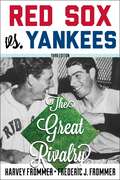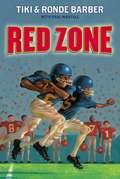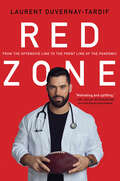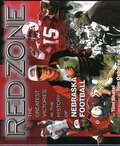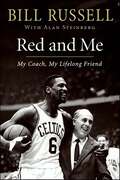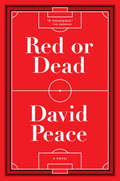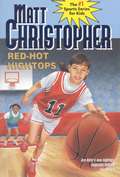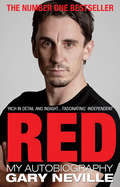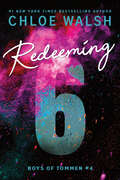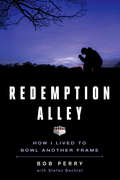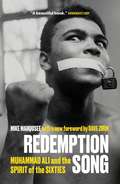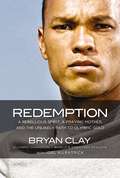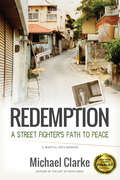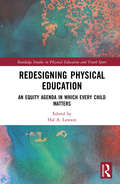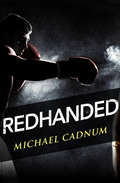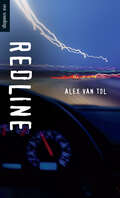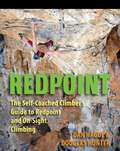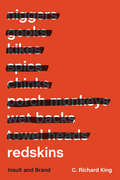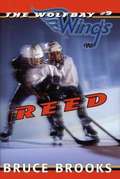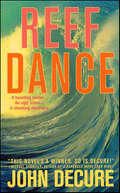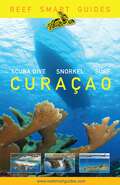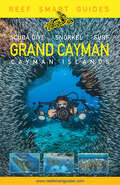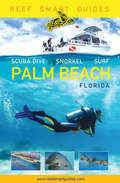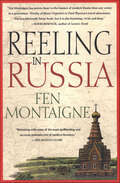- Table View
- List View
Red Sox vs. Yankees: The Great Rivalry
by Harvey Frommer Frederic J. FrommerThe rivalry between the New York Yankees and Boston Red Sox involves not just the teams, but the cities, owners, ballparks, fans, and the media. Its roots reach back to before even Babe Ruth and Harry Frazee, yet it is as contemporary as the next Red Sox–Yankees game. This book tells the story of the rivalry from the first game these epic teams played against each other in 1901 through the 2013 season in what former New York Mayor Rudy Giuliani called &“the best rivalry in any sport.&”
Red Zone
by Paul Mantell Tiki Barber Ronde BarberThe Hidden Valley Eagles have the championship in sight--but will chicken pox get in the way?The Hidden Valley Eagles are on track to make the playoffs. Full of focus and determination, every player is at his best, and the team is working better together than ever before. But when a bout of chicken pox threatens to overtake the team, will their playoff dreams disappear?
Red Zone: From the Offensive Line to the Front Line of the Pandemic
by Laurent Duvernay-TardifIn July 2020, Laurent Duvernay-Tardif sent shockwaves through the sports world by becoming the first NFL player to opt out of the upcoming season during the global pandemic As plans for the 2020 NFL season ramped up and daily cases of Covid-19 continued to skyrocket, Laurent Duvernay-Tardif, a fixture on the offensive line of the Kansas City Chiefs, stepped away from the game he loved. Not only an active player but also a medical school graduate, Laurent withdrew when he realized that continuing to play—and potentially spreading the virus—was antithetical to everything he believed in. For the first time in his remarkable career, Laurent couldn’t reconcile his twin passions of football and medicine, and with his team’s Super Bowl win only months behind him, found himself on the front lines of the pandemic, working in a long-term care facility in Quebec. But that was just the beginning of the story. As Laurent settled into his new reality, he quickly came up against a severe Covid outbreak in his hospital unit. Meanwhile, his team, the Kansas City Chiefs, entered the playoffs as the favorites to repeat as champions in a season that saw countless games postponed due to league-wide outbreaks, including one on his own offensive line. From the incredible highs of winning the Super Bowl to the burnout of working as an orderly, Red Zone takes readers inside Laurent’s life as he grapples with his roles of medical professional and NFL football player during a global pandemic. But this captivating memoir also reveals Laurent’s remarkable personal story, detailing how his insatiable curiosity and solid work ethic led him from his family’s bakery in Montreal to his role as one of the most fascinating and accomplished people in professional sports.
Red Zone: The Greatest Victories in the History of Nebraska Football
by Tom ShatelRed Zone: The Greatest Victories in the History of Nebraska Footbal takes you back to the colorful characters and breathing moments that made Nebraska football the greatest program in college football and the pride of the state of Nebraska.
Red and Me: My Coach, My Lifelong Friend
by Alan Steinberg Bill RussellNew York Times Bestseller"On the subject of his love of Red Auerbach and his Celtic teammates, Russell is loud and clear. He might object to my use of the word 'love,' but deny it though you will, Mr. Russell, that's what sits at the heart of this beautiful book." — Bill Bradley, New York Times Book ReviewIn Red and Me, Boston Celtics basketball legend Bill Russell pays homage to his mentor and coach, the inimitable Red Auerbach. A poignant remembrance of a life-altering relationship in the tradition of Big Russ and Me and Tuesdays With Morrie, Red and Me tells an unforgettable story of one unlikely and enduring friendship set against the backdrop of the greatest basketball dynasty in NBA history.Red Auerbach was one of the greatest basketball coaches in sports history. Bill Russell was the star center and five-time MVP for Auerbach's Celtics, and together they won eleven championships in thirteen years. But Auerbach and Russell were far more than just coach and player. A short, brash Jew from Brooklyn and a tall, intense African-American from Louisiana and Oakland, the men formed a friendship that evolved into a rare, telling example of deep male camaraderie even as their feelings remained largely unspoken.Red and Me is an extraordinary book: an homage to a peerless coach, which shows how he produced results unlike any other, and an inspiring story of mutual success, in which each man gave his all and gained back even more. Above all, it may be the most honest and heartfelt depiction of male friendship ever captured in print.
Red or Dead
by David Peace"A masterpiece."--The ObserverFrom the bestselling author of The Damned Utd and The Red Riding Quartet comes a major new novel The place where the swinging sixties started - Liverpool, England, birthplace of the Beatles - wasn't so swinging. Amid industrial blight and a bad economy, the port town's shipping industry was going bust and there was widespread unemployment, with no assistance from a government tightening its belt. Even the Beatles moved to London. Into these hard times walked Bill Shankly, a former Scottish coal miner who took over the city's perpetually last-place soccer team. He had a straightforward work ethic and a favorite song - a silly pop song done by a local band, "You'll Never Walk Alone." Soon he would have entire stadiums singing along, tens of thousands of people all dressed in the team color red . . . as Liverpool began to win . . . And soon, too, there was something else those thousands of people would chant as one: Shank-lee, Shank-lee . . . In Red or Dead, the acclaimed writer David Peace tells the stirring story of the real-life working-class hero who lifted the spirits of an entire city in turbulent times. But Red or Dead is more than a fictional biography of a real man, and more than a thrilling novel about sports. It is an epic novel that transcends those categories, until there's nothing left to call it but - as many of the world's leading newspapers already have - a masterpiece.From the Hardcover edition.
Red-Hot Hightops
by Matt ChristopherNormally fearful to play basketball in front of a crowd, Kelly becomes a confident and aggressive player when she dons a mysterious pair of red sneakers that she finds.
Red: My Autobiography
by Gary NevilleNo player has been more synonymous with the glory years of Manchester United Football Club over the past two decades than right-back Gary Neville. An Old Trafford regular since he attended his first match at the age of six, captain of the brilliant 1992 FA Youth Cup-winning team that became known as 'Fergie's Fledglings', outspoken representative of MUFC, Neville is the ultimate one-club man. He has been at the heart of it all and, at the end of an amazing career, is now ready to tell it all.Authoritative, insightful, fearless and never less than 100% honest, no-one has better credentials for documenting the story of United under Sir Alex Ferguson. Neville reveals the behind-the-scenes secrets of his early days with the likes of Giggs, Scholes and his best mate David Beckham; what it was like to play with Cantona, Keane and Ronaldo; the Treble in 1999; and of course an entire career of playing for the greatest manager in the game.Then there are all his experiences with England, from being the youngest starter at Euro 96 when football came home, to the ups and downs of five major championships and seven managers - Venables, Hoddle, Wilkinson, Keegan, Eriksson, McClaren and Capello. There are opinions and analysis on Gazza, Rooney, WAGs and the true story of the FA and Rio Ferdinand.For twenty glorious years, Gary Neville has worn his heart on his sleeve. This is his story.
Redeeming 6 (Boys of Tommen #4)
by Chloe WalshAn epic and unforgettable love story continues in Redeeming 6, the fourth book in the international bestselling and TikTok-phenomenon Boys of Tommen series, from Chloe Walsh.I'm saving you, six.Joey Lynch's life is falling apart. Obsessed with proving himself to the only person he's ever truly trusted, Joey fights to stay away from a world that could destroy his life. The odds are against him, but can he keep his head above water?Aoife is absolutely unwilling to give up the boy she loves, so she is determined to save him from self-destruction. She becomes trapped in a world she doesn't understand, but her heart is stronger than what's trying to drag her down. Aoife will never give up on Joey, no matter how much is stacked against them.Through heartbreak and horror, Aoife and Joey have had each other's backs, and this time is no different.Following the beloved pairing from Saving 6, Redeeming 6 will only increase your love for the Boys of Tommen universe. This book is perfect for readers looking for:New adult/YA crossover Irish romanceDual POVsFriends-to-loversAngsty tearjerkersBingeworthy TikTok booksReaders are saying:"This book brought me back to life.""JOEY AND AOIFE FOREVER.""THIS SERIES OWNS A PART OF MY SOUL.""I read this in under 24 hrs.""Chloe Walsh writes the kind of romance novels where you can just tell the [characters] are SOULMATES, literally made for each other, two pieces of a puzzle! Joey and Aoife are everything and deserve the whole world!!!"
Redemption Alley: How I Lived to Bowl Another Frame
by Stefan Bechtel Bob PerryAfter hitting rock bottom through addiction, bowling legend Bob Perry learned that religion is for people who don't want to go to hell. Spirituality is for people who have already been there. Perry tells his heart-wrenching, inspiring story of bowling for the mob and drug and alcohol addiction in his new book, Redemption Alley.Perry, considered by many to be one of the most naturally-talented bowlers in the history of the sport, had potential to become one of the best even at the young age of 12. Unfortunately, he grew up in 1970's Paterson, New Jersey, where everyone knew someone who was "connected"—with the mob, that is. Instead of training for championships, Perry began doing odd jobs for wiseguys and hustling hundreds of thousands of dollars in after-house "action bowling" for John Gotti, who later became the boss of the Gambino crime family. Perry's connections with organized crime eventually landed him in federal prison, but not before he became addicted to crack cocaine, alcohol, and painkillers and was homeless on the streets of New York. Ultimately, Perry washed up on the shores of St. Christopher's Inn, a shelter run by Franciscan monks. It was there that he had six fateful encounters with an angelic messenger who no one else could see-a monk whose message was so powerful that Bob Perry has now been sober for 22 years.In Redemption Alley, Perry not only shares his remarkable story of bowling success, his dangerous association with hoodlums and gangsters, and his recovery from addiction, but also his inspiring, decades-long spiritual quest, and his sober journey back into the bowling world.
Redemption Song: Muhammad Ali and the Spirit of the Sixties
by Mike MarquseeShortlisted for the 1999 William Hill Sports Book of the Year Award and voted one of twenty-five "Books to Remember 2000" by the New York Public Library Is there a more characteristic figure of the sixties than Muhammad Ali--playful and political, popular and non-conformist, defiant and triumphant? In a unique new book, Mike Marqusee puts the great boxer back in his true historical context to explore a crucial moment at the cross-roads of popular culture and mass resistance. He traces Ali's interaction with the evolving black liberation and anti-war movements, including his brief but fascinating liaison with Malcolm X, as well as his encounters with Martin Luther King. Marqusee's elegant and forceful narrative explores the origins and impact of Ali's dramatic public stands on race and the draft, and reinterprets the "Rumble in the Jungle," shedding new light on its triumph and tragedy. Above all, he imbues Ali's story with a long-neglected international dimension, revealing why he was embraced with such warmth by diverse peoples across the globe. This timely antidote to the apolitical celebration of Ali as "a great American" revisits the man and the period with a fresh eye, casting new light on both his courage and his confusions. And, in a new afterword for this second edition, Marqusee reflects on Ali's legacy in the era of the "war on terror."From the Trade Paperback edition.
Redemption: A Rebellious Spirit, a Praying Mother, and the Unlikely Path to Olympic Gold
by Bryan ClayThis is the story of the most unlikely Olympic decathlete in history. Despite size and stature, Bryan Clay is the defending champion of the 2008 Olympic gold medal and winner of the 2004 Olympic silver medal in the decathlon. His journey is as inspiring as it is gritty, as troubled as it is triumphant.Far more than just a sports memoir, Redemption details the drudgery, devastation, and ultimate conversion that led Bryan to become a world champion. "[God] had a plan when I believed that dreams never came true because, in my life, they never did," says Bryan. Through a remarkable series of events and devoted prayers of his mother, Bryan's life was turned around into a victorious narrative of truly being redeemed.
Redemption: A Street Fighter's Path to Peace
by Michael Clarke"A British "karateka" offers a bone-crushing, lip-splitting, and often elegant memoir of a tough guy searching for higher meaning through the study of martial arts." "In this memoir describing how karate turned his life around, Clarke displays passion and grit in spades." Michael Clarke was an angry, vicious kid, a street fighter. He grew up in the late sixties and early seventies in Manchester, England, in a tough neighborhood where, he writes, "Prostitutes worked the pavement opposite my home, illegal bookmakers took bets in back alley cellars, and street brawls were commonplace." He left school at fifteen and began his education as a pugilist on the streets. He fought in bars and clubs, at football matches, in parks, and in bus stations--and he was good. He reveled in the victories and the admiration they brought. It was a life of knuckles and teeth, of broken bones and torn flesh--and the arrests that followed. Clarke was seventeen when a judge sentenced him to two years in Strangeways Prison, an infamous place also known as "psychopath central." In prison he resolved to change his life and stay out of trouble, but trouble was everywhere. He discovered a world of violent gangs, abusive guards, and inmates engaged in an endless struggle for dominance. Strangeways was a place where a person could get stabbed to death for taking the bigger piece of toast. In time Clarke was released, but the transition was difficult and he almost fought his way back to prison. Then one night he entered a karate dojo and his life changed forever. He began a lifetime pursuit of budo, the martial way. He sought knowledge, studied with masters, and traveled to Okinawa, the birthplace of karate. Redemption: A Street Fighter's Path to Peace is a true account of youth wasted and life reclaimed. Michael Clarke reminds us that martial arts are not simply about punching and kicking. They forge the spirit, temper the will, and reveal our true nature.
Redesigning Physical Education: An Equity Agenda in Which Every Child Matters (Routledge Studies in Physical Education and Youth Sport)
by Hal A. LawsonRedesigning Physical Education is a bold and innovative manifesto for the fundamental redesign of physical education for the twenty-first-century world. Aiming at better outcomes for children, better working conditions for teachers, and innovative solutions to the decline of school PE, it calls for a transnational collective action project based on new research frameworks, stressing the fundamental importance of health-enhancing, life-enriching active participation for all children and young people. Action-oriented and evidence-based, the book examines the key challenges driving change, including the equity agenda, institutionalization, outcome and accountability based teaching, and physical activity requirements in schools. With a truly international scope, the text explores perspectives from the USA, Canada, Scotland, England, Wales, Ireland, New Zealand, Australia, and Italy. This is important reading for students and academics studying and working in physical education, kinesiology, public health, and children’s physical activity. It is also a valuable resource for pediatric exercise specialists, especially sport and exercise psychologists.
Redhanded
by Michael CadnumA teenage boxer learns how to fight dirty--in and out of the ring As soon as the bell chimes, Steven knows he's in trouble. Del Toro is stronger, faster, and in better shape; he's by far the better boxer. But Steven has been learning to fight dirty. He steps on Del Toro's toes, whips his head into the bigger man's chin, and throws a straight right just wide enough to send his elbow crashing into his nose. It isn't pretty, and it isn't honest, but it works. In the boxing ring, and in life, Steven is never afraid to cheat. Invited to San Diego for a prestigious Golden Gloves West Coast tournament, Steven needs $600 to make the trip. A friend convinces him to get the money the easy way--by robbing a liquor store, and Steven soon learns there are fights where throwing in the towel means death.
Redline (Orca Soundings)
by Alex Van TolJenessa escapes to the sanctuary of her car and the freedom of the open road, where she can outrun her memories...if only for a while. She finds a kindred spirit in Dmitri, a warm-hearted speed demon who races at the track. But when Jenessa falls in with a group of street racers—and its irresistible leader, Cody—she finds herself caught up in a web of escalating danger. When her penchant for risk-taking spirals out of control, Jenessa has to find a way to break the self-destructive patterns she's built—before anyone else gets hurt.
Redpoint
by Douglas Hunter Dan HagueThe first in-depth book on redpointing, where the climber does not weight the rope or pull or stand on manmade equipment.
Redskins: Insult and Brand
by C. Richard KingThe Washington Redskins franchise remains one of the most valuable in professional sports, in part because of its easily recognizable, popular, and profitable brand. And yet “redskins” is a derogatory name for American Indians. The number of grassroots campaigns to change the name has risen in recent years despite the current team owner’s assertion that the team will never do so. Franchise owners counter criticism by arguing that the team name is positive and a term of respect and honor that many American Indians embrace. The NFL, for its part, actively defends the name and supports it in court. Prominent journalists, politicians, and former players have publicly spoken out against the use of “Redskins” as the name of the team. Sportscaster Bob Costas denounced the name as a racial slur during a halftime show in 2013. U.S. Representative Betty McCollum marched outside the stadium with other protesters––among them former Minnesota Vikings player Joey Browner––urging that the name be changed.Redskins: Insult and Brand examines how the ongoing struggle over the team name raises important questions about how white Americans perceive American Indians, about the cultural power of consumer brands, and about continuing obstacles to inclusion and equality. C. Richard King examines the history of the team’s name, the evolution of the term “redskin,” and the various ways in which people both support and oppose its use today. King’s hard-hitting approach to the team’s logo and mascot exposes the disturbing history of a moniker’s association with the NFL—a multibillion-dollar entity that accepts public funds—as well as popular attitudes toward Native Americans today.
Reed (Wolfbay Wings #9)
by Bruce BrooksReed is a scoring machine an aggressive, mean player who can manufacture breakaways from thin air and shoot like a pro. When his selfish style of play gets him kicked off the Bowie A's, he joins the Wolfbay Wings. Reeds determined to be the best on his new team and not just because his sadistic older brothers will put him in the hospital if he isn't. But one of his bad moves puts a teammate out of commission, and Reeds forced to play defense or not at all. Reeds always thought that defense men are wimps who just couldn't make it as centers. Can he learn to play defense when everything inside him screams offense?
Reed: A Cold Fury Hockey Novel (Carolina Cold Fury Hockey #10)
by Sawyer BennettThe offseason is heating up for one Carolina Cold Fury heartbreaker who’s eager to make nice with the girl next door. No one plays like Reed Olson, whether it’s hockey season or not. After back-to-back NHL championships, he’s craving a little R&R. Reed leans to a specific type—blond, busty, and interested—and fortunately he has a little black book full of options. So why is it he can’t stop dreaming about the new girl who just moved in next door? A certified brainiac, she seems to want nothing to do with the hard-bodied athlete. Josie Ives desperately needs something her celebrity neighbor obviously doesn’t: solitude. Reed is everything she imagined—a little too good-looking, with a body that puts Greek gods to shame. But she didn’t expect he would also be funny and charming. Josie knows she’s the opposite of his type, and that’s fine with her. Still, the chemistry between them is undeniable. Their newfound friendship certainly has its benefits, but she’s starting to wonder if opposites really do attract.Praise for Reed“Sawyer Bennett is my go-to author for all things sexy. And Reed certainly blew my skates right off!”—USA Today bestselling author Stacey Kennedy “Reed has quickly become one of my favorite books in the series. If you are a longtime lover of the Cold Fury boys like me, then you don’t want to miss this one. I guarantee that if you are grabbing this one as a standalone, it will make you want to jump in feet first to the entire series.”—Red Cheeks Reads The Carolina Cold Fury series from New York Times bestselling author Sawyer Bennett can be read together or separately: ALEX GARRETT ZACK RYKER HAWKE MAX ROMAN LUCAS VAN REED The Love Hurts series features sexy standalone novels: SEX IN THE STICKS JILTED And the Sugar Bowl series is one treat you’ll want to read in order: SUGAR DADDY SUGAR RUSH SUGAR FREE “One of the best voices in contemporary romance.”—New York Times bestselling author Lauren Layne Includes an excerpt from another Loveswept title.
Reef Dance (J. Shepard Mysteries)
by John DecureThere is a certain poise that comes with understanding the ocean's moods, tapping a pulse borne of a distinct, untamed, unfathomable energy source. An equilibrium, located on a singular track between the sucking trough and the pitching crest. A sense of perfect balance on a rolling, temporary stage, not a single movement wasted. A spray-blinded late takeoff in roaring Santa Ana winds. A confidence, knowing your instincts won't let you down.Thirteen years ago J. Shepard's mother rose before dawn, packed a bag and walked out of his life forever. Since then, the rolling surf has been his only escape, a refuge from the daily stress of his job defending parents in the overburdened L.A. juvenile dependency court, and from the dark, unanswered questions of his past. When J. is assigned a high profile case, one in which a mother is accused of selling her child to the highest bidder, even a day in the surf won't let him escape. J. can't hide from the media attention that the case draws, and nor can he hide from the painful memories of his own desertion that the case congers. He realizes that if he does not confront the mystery of his own past he will always be stuck in equilibrium, unable to move against his emotional and physical tide. He will be stuck in the darkest spot in the ocean, the reef dance.J. simultaneously throws himself into the case and search for the reasons behind his own mother's disappearance. In order to succeed in both areas, however, he must rely on an old friend, Jackie Pace, a wayward surfing legend with a sordid past, that no one believes is reliable. But J. needs his friends help, and Jackie must rise to the challenge not just because he is J.'s friend but because he is much more intimately linked to the mystery than J. could ever know.Reef Dance will suck you into the surfer's pacific, pulling you deep within it's mystery, and the turmoil of one man's soul.
Reef Smart Guides Curaçao: (best Diving And Snorkeling Spots In Curaçao) (Reef Smart Guides)
by Peter McDougallThe Definitive Guide to Scuba Diving and Snorkeling in Curaçao #1 New Release in Scuba Travel Guides and in Aruba & Netherlands Antilles Travel From the authors of the Reef Smart Guides series comes Reef Smart Guides Curaçao, a unique and essential scuba, snorkel, and surf travel guide for the island of Curaçao-one of the top shore diving and snorkeling islands in the Caribbean. A great travel gift. The ultimate guide for visitors and locals looking to explore the underwater world in Curaçao. This guidebook provides detailed descriptions and imagery of the island’s best dive and snorkel sites, including shipwrecks and coral reefs. The guide also details popular beaches, surfing and kiteboarding sites and gives recommendations for dive operators to use and restaurants to visit. Detailed descriptions and 3D maps. With the help of Reef Smart’s unique 3D-mapping technology, learn all you need to know about the region’s top dive and snorkel sites, including the world famous Superior Producer wreck, Tugboat, and popular shore-accessible coral reef sites like Director’s Bay, Double Reef and Fisherman’s Wharf and Playa Marie Pampoen. Don’t go diving without it. This indispensable resource helps you plan and execute dives without a hitch. Make sure to pack this unique guidebook with the rest of your scuba gear! This guidebook provides: Descriptions of 95 dive and snorkel sites in Curaçao, including Klein Curaçao Detailed 3D maps of 38 of the most popular sites, with access imagery for an additional 46 sites A 31-page species guide to help you identify and understand the marine creatures you’ll encounter And so much more! A unique and comprehensive scuba diving book. Also look for Reef Smart Guides Bonaire; Grand Cayman, and Barbados, as well as our guides to diving and snorkeling throughout the state of Florida. If looking to learn more about the world’s ocean, and specifically coral reefs, check out Beneath the Blue Planet.
Reef Smart Guides Grand Cayman (Reef Smart Guides)
by Peter McDougall Ian Popple Otto WagnerThe Definitive Guide to Scuba Diving and Snorkeling in The Grand Cayman Islands“The collection of Reef Smart Guides is a great resource for the touring diver. Incredible detailed 3D maps and up to date editorial content based on information from local dive experts, these cutting edge guidebooks are a must have for all scuba divers before they travel.” Clearly Cayman Dive Resorts#1 New Release in Scuba Travel Guides, Caving & Spelunking, and SwimmingFor Lonely Planet fans comes a unique and essential scuba, snorkel, and surf travel guide.A great Caribbean travel book. The ultimate guide for beach and marine activities in the Grand Cayman Islands. The detailed descriptions and illustrations of beaches, coral reefs, shipwrecks, and other dive spots are ideal for divers, snorkelers and surfers. Make the most of your time on the Island and in the water.Detailed descriptions and map art. Reef Smart catalogues the beaches, surf spots, and dive and snorkel sites in the Cayman Islands. With the help of Reef Smart’s unique 3D-mapping technology, learn all you need to know about the regions' top dive and snorkel sites. These maps provide useful information such as depths, currents, waves, suggested routes, potential hazards, unique structures, and species information.Don’t go diving without it. This indispensable resource will help you plan and execute dives without a hitch. Pack this guidebook with the rest of your scuba gear.Guidebook provides:The best locations for diving, snorkeling, and surfing, and how to access themDetailed 3D maps, graphics, and information to help you plan your time in and out of the waterSpecies guide to help you identify and understand the marine creatures in the Cayman Islands and its surrounding areasAnd much more!A unique and comprehensive SCUBA diving book. Also look for Reef Smart Guides Florida: Fort Lauderdale, Pompano Beach, and Deerfield Beach; Reef Smart Guides Barbados; and the best-selling Reef Smart Guides Bonaire.
Reef Smart Guides Palm Beach, Florida: Scuba Dive. Snorkel. Surf. (Reef Smart Guides)
by Peter McDougall Ian Popple Otto WagnerThis illustrated travel guide features some of the best diving spots and surfing beaches in Florida—with unique 3D maps and information on local wildlife.From Del Ray Beach to Shark Canyon, Palm Beach County is home to some of the most beautiful and exhilarating locations in Florida. This complete guide features detailed descriptions and illustrations of beaches, coral reefs, shipwrecks, and other dive spots. Reef Smart’s unique 3D-mapping technology provides essential information such as depths, currents, waves, suggested routes, potential hazards, unique structures and species information.
Reeling In Russia: An American Angler In Russia
by Fen MontaigneIn the summer of 1996, award-winning journalist Fen Montaigne embarked on a hundred-day, seven-thousand-mile journey across Russia. Traveling with his fly rod, he began his trek in northwestern Russia on the Solovetsky Islands, a remote archipelago that was the birthplace of Stalin's gulag. He ended half a world away as he fished for steelhead trout on the Kamchatka Peninsula, on the shores of the Pacific. His tales of visiting these far-flung rivers are memorable, and at heart, Reeling in Russia is far more than a story of an angling journey. It is a humorous and moving account of his adventures in the madhouse that is Russia today, and a striking portrait that highlights the humanity and tribulations of its people.In the end, the reader is left with the memory of haunted northern landscapes, of vivid sunsets over distant rivers, of the crumbling remains of pre-Revolutionary estates, and a cast of dogged Russians struggling to build a life amid the rubble of the Communist regime.
